Published on April 17, 2025 by Shreya
A glimpse into the changing wholesale business landscape
The wholesale sector is witnessing a significant transformation, shaped by emerging wholesale trends, including sustainability, AI, and e-commerce, as businesses adapt to evolving consumer demands and technological advancements. With the number of conscientious buyers increasing, sustainability has become a central focus, and companies are prioritising eco-friendly production processes and sustainable sourcing and reducing their environmental footprint. AI is helping revolutionise inventory and supply-chain management, enabling predictive analytics-based demand forecasting, personalising customer experiences, streamlining operations and enhancing decision-making. Meanwhile, with e-commerce platforms, wholesale companies expanding their digital presence in efforts to reach global markets are streamlining purchasing and offering greater convenience to customers. These trends are transforming the wholesale sector, pushing it towards a more efficient, tech-driven and environmentally responsible future.
Sustainability: a pillar of modern wholesale
Since the pandemic, sustainability has become a central focus of business strategies across sectors. Sustainable wholesale practices are gaining momentum as both upstream and downstream components of the consumer products value chain incorporate sustainability into their operations. With the wholesale sector being the midstream component of the value chain, companies are realising the need to integrate sustainable practices into their operations.
The following is from a 2024 survey1 of wholesale and distribution companies:
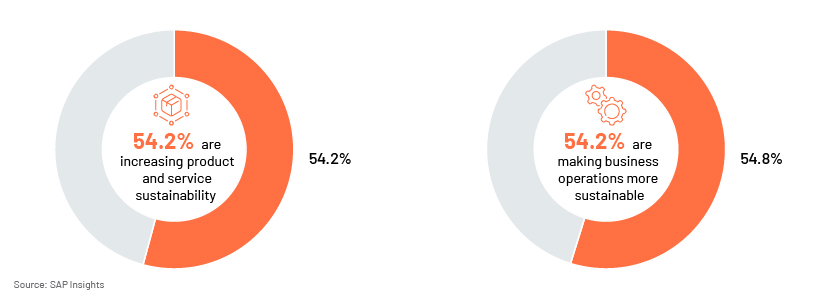
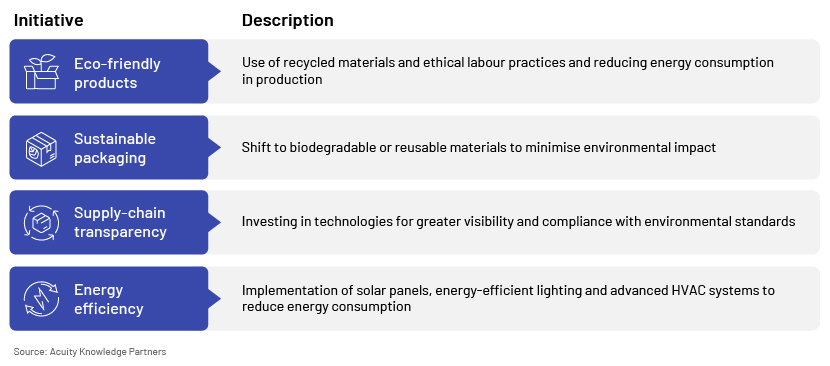
Eco-friendly products
Consumers and businesses alike are demanding eco-friendly products. Wholesalers are responding by offering goods that are produced sustainably, whether through the use of recycled materials, reduced energy consumption or ethical labour practices. This shift not only helps reduce the environmental impact but also appeals to a growing segment of environmentally-conscious consumers who prioritise sustainability in their purchasing decisions. For instance, products marketed as sustainable grew 2.7 times faster than those that were not. Additionally, 78% of consumers feel that sustainability is important, and 55% are willing to pay more for eco-friendly brands.2
Sustainable packaging
Sustainable packaging is becoming a standard requirement, with many companies shifting to biodegradable or reusable materials to minimise their environmental footprint. Innovations in packaging technology are making it easier for businesses to adopt eco-friendly options without compromising on quality or durability. This trend is driven by both regulatory pressures and a genuine commitment to reducing waste and promoting a circular economy. For example, the global sustainable packaging market was valued at USD271.86bn in 2023 and is expected to grow by 7.67% from 2023 until 2028. Furthermore, 50% of consumers are willing to pay a higher price for products that come in sustainable packaging.3
Supply-chain transparency
Wholesalers and distributors are investing in transparency within supply chains, aiming to minimise their ecological footprint by implementing strategies that reduce energy consumption, decrease waste generation, decarbonise the fleet and promote overall environmental responsibility. Transparency within supply chains helps wholesalers achieve greater visibility to ensure that each step of the process adheres to environmental standards. This helps not only to reduce the carbon footprint but also to build trust with consumers who are increasingly scrutinising the origins of their purchases.
Energy efficiency
Energy consumption is a significant concern for the wholesale sector, particularly in logistics and warehousing. Innovations in energy-efficient technologies are helping companies reduce their energy use. Solar panels, energy-efficient lighting and advanced HVAC systems are examples of how wholesalers are cutting down on energy costs and reducing their environmental impact.
AI: revolutionising wholesale operations
AI is transforming the wholesale sector by enhancing operational efficiency, improving customer engagement, and enabling smarter decision-making. As AI wholesale adoption grows, businesses leverage intelligent solutions to optimize processes and gain a competitive edge.
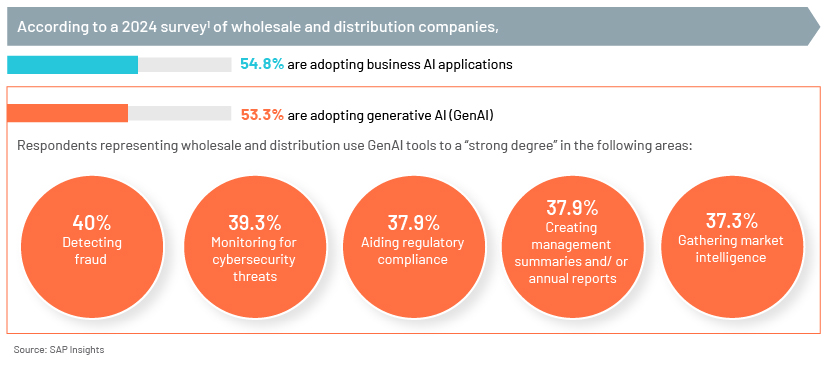
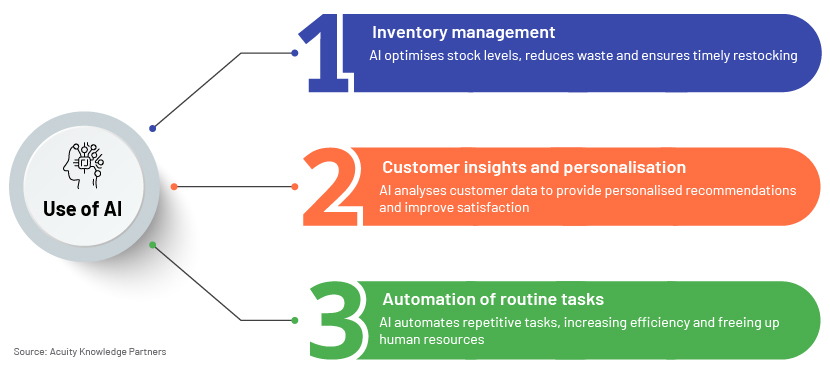
Inventory management
AI-powered smart inventory management systems are revolutionising how wholesalers track and manage their stock. These systems use predictive analytics to forecast demand accurately, reducing the risk of overstocking or stockouts. Smart inventory management solutions help wholesalers with real-time tracking of inventory movements, maintaining inventory levels and sending order warnings; these reduce waste and improve profit margins.
Customer insights and personalised offerings
AI-/ML-based tools enable wholesalers to assess patterns in customer behaviour for recommending personalised offerings. Through analysing vast customer datasets, AI helps identify buying patterns, trends and preferences, enabling businesses to create personalised marketing campaigns. Personalised and targeted marketing strategies can significantly enhance customer satisfaction and loyalty.
Automation of routine tasks
AI-based intelligent automation helps reduce manual effort and errors in routine tasks such as data entry, order and invoice processing, and handling customer inquiries. This ultimately improves business productivity by allowing human resources to focus on more strategic and value-driven activities.
E-commerce: the new frontier for wholesalers
Wholesale e-commerce is gaining popularity as more traditional B2B businesses move their operations online, especially after the pandemic. This enables wholesalers to cater to demands of a wide base of customers, both domestic and international. Growing digitalisation at downstream businesses along the consumer product value chain is fuelling the adoption of online marketplaces.
According to survey results published in June 20224:
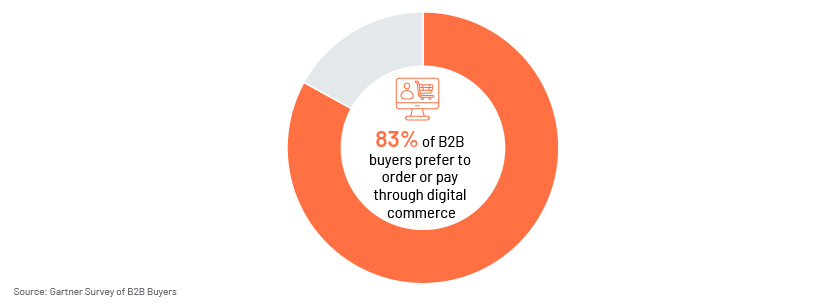
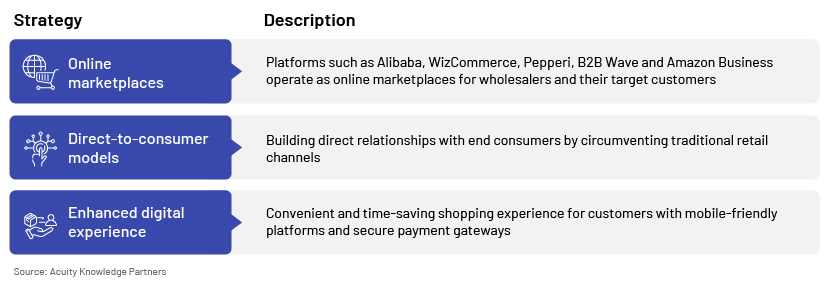
Online marketplaces
There has been a major shift to e-commerce for wholesale purchase of consumer products, pushing businesses to re-assess their traditional business models and adapt to online marketplaces. The shift was triggered mainly by the pandemic, with wholesalers and distributors who invested in digital technologies experiencing a notable increase in their brands’ positioning and customer reach. Online marketplaces such as Alibaba, WizCommerce, Pepperi, B2B Wave and Amazon Business provide a convenient and faster way for buyers to source products, compare prices and place orders.
Direct-to-consumer (DTC) models
Wholesalers are building a new revenue stream through the DTC model by circumventing conventional retail channels. This approach enables wholesalers to bypass downstream players in the consumer products value chain and directly cater to demand of end consumers. It also provides an opportunity to attract a wide range of customers by offering promotions and discounts, as the cost to customers is lesser than that of traditional retail channels.
Enhanced digital experience
Wholesale e-commerce has several benefits for buyers, such as a user-friendly interface, advanced search and filtering options, bulk-ordering capabilities, secure payment processes, a convenient and time-saving shopping experience and good supply-chain visibility. Customers are also attracted by the promotions and discounts offered by wholesale platforms, as traditional channels usually do not offer large discounts.
Conclusion
The wholesale sector is transforming due to adopting sustainable practices, AI-powered operations and online marketplaces. These trends are interconnected and are significantly influencing the sector's growth trajectory. Companies that embrace these changes are likely to thrive, and those resisting them may struggle to survive. By strategically investing in sustainability, leveraging AI and capitalising on e-commerce, wholesalers could gain a competitive advantage over peers. Their willingness and ability to adapt to changing wholesale-market dynamics and consumer preferences would be crucial to maintaining a leading edge.
How Acuity Knowledge Partners can help
Acuity Knowledge Partners offer end-to-end consulting and advisory solutions for the retail and CPG sector. Services include comprehensive insights and strategic solutions spanning the entire retail/consumer products value chain, helping to effectively navigate the sector’s current and projected landscape. Our expertise covers a wide range of areas such as market research and estimation, strategy development, commercial and financial due diligence, benchmarking (operational, financial, technology and pricing, among others), go-to-market strategy, competitive intelligence, market/opportunity assessment, demand-gap analysis, opportunity analysis, industry KPIs, location and sales channel analysis, consumer intelligence and sustainability metrics. We strive for excellence in providing timely support, facilitating efficient operations and addressing specific business needs.
References:
-
https://www.sap.com/research/wholesalers-look-to-analytics-and-ai-for-growth?source=blogs-glo-FoC
-
https://theroundup.org/environmentally-conscious-consumer-statistics/
-
https://theconsciousinsider.com/sustainable-packaging-statistics-market/
-
https://www.the-future-of-commerce.com/2024/12/20/wholesale-distribution-trends-2025/
Tags:
What's your view?
About the Author
Shreya is a Delivery manager in Acuity Knowledge Partners supporting consulting & corporate clients, across sectors. She has a nearly 11+ years of rich experience in business advisory & consulting, deal strategy, industry mapping, market analysis/sizing, competitive benchmarking, among others
She also attended several technology oriented international conferences including Cloud Expo Asia, RSA Conference, DevOps India Summit, Forgerock Identity Day and many others
Shreya is a Certified PMP (Project Management Professional) accredited by the PMI (Project Management Institute). She holds a MBA degree in International Business from University of Petroleum & Energy Studies (Dehradun)
Like the way we think?
Next time we post something new, we'll send it to your inbox










